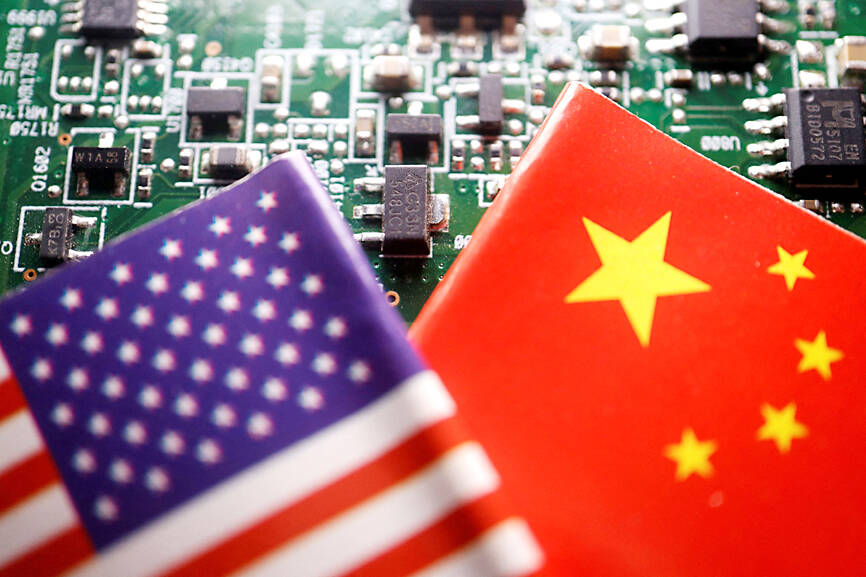US President Joe Biden’s administration is weighing additional curbs on sales of semiconductor equipment and artificial intelligence (AI) memory chips to China that would escalate the US crackdown on Beijing’s tech ambitions, but stop short of some stricter measures previously considered, said sources familiar with the matter.
The restrictions could be unveiled as soon as next week, said the sources, who emphasized that the timing and contours of the rules have changed several times, and that nothing is final until they are published.
The measures follow months of deliberations by US officials, negotiations with allies in Japan and the Netherlands, and intense lobbying by US chip equipment manufacturers who have warned that tougher measures would bring catastrophic harm to their business.

Photo: REUTERS
The latest proposal has key differences from earlier drafts, the sources said. The first is which Chinese companies the US would add to a trade restriction list. The US had previously considered sanctioning six suppliers to Huawei Technologies Co (華為), and officials are aware of at least a half dozen more, the sources said.
They now plan to add only some of those Huawei suppliers to the entity list, with the notable omission of ChangXin Memory Technologies Inc (長鑫存儲), which is trying to develop AI memory chip technology.
The rules now under consideration would also sanction two chip factories owned by Semiconductor Manufacturing International Corp (SMIC, 中芯), Huawei’s chipmaking partner, the sources said.
More than 100 additional entity listings would focus on Chinese companies that make semiconductor manufacturing equipment, the sources said, rather than fabrication facilities that make the chips themselves.
That is a partial win for US chip gear manufacturers — Lam Research Corp, Applied Materials Inc and KLA Corp — that have argued for months against unilateral US restrictions on key Chinese companies, including the six Huawei suppliers.
They have said that such sanctions would put them at an unfair disadvantage compared with foreign rivals Tokyo Electron Ltd and Dutch equipment giant ASML Holding NV, whose governments have not yet agreed to the toughest restrictions on sales to China.
Japan and the Netherlands imposed some China curbs to partially match US measures from 2022, but both countries have resisted recent US pressure for even tighter controls.
The new US rules, which also restrict some additional tool categories, would still exempt allies, including Japan and the Netherlands, from the so-called foreign direct product rule — which allows Washington to control sales of products made anywhere in the world, provided they use even the smallest amount of US technology, sources familiar with the matter said.
It is unclear whether Japan or the Netherlands would eventually impose additional restrictions on the Chinese companies that the US now plans to sanction.
The latest version of the US controls would include some provisions around high-bandwidth memory chips, which handle data storage and are essential to AI. Samsung Electronics Co and SK Hynix Inc along with US memory manufacturer Micron Technology Inc are expected to be affected by the new measures, the sources said.

Intel Corp chief executive officer Lip-Bu Tan (陳立武) is expected to meet with Taiwanese suppliers next month in conjunction with the opening of the Computex Taipei trade show, supply chain sources said on Monday. The visit, the first for Tan to Taiwan since assuming his new post last month, would be aimed at enhancing Intel’s ties with suppliers in Taiwan as he attempts to help turn around the struggling US chipmaker, the sources said. Tan is to hold a banquet to celebrate Intel’s 40-year presence in Taiwan before Computex opens on May 20 and invite dozens of Taiwanese suppliers to exchange views

Application-specific integrated circuit designer Faraday Technology Corp (智原) yesterday said that although revenue this quarter would decline 30 percent from last quarter, it retained its full-year forecast of revenue growth of 100 percent. The company attributed the quarterly drop to a slowdown in customers’ production of chips using Faraday’s advanced packaging technology. The company is still confident about its revenue growth this year, given its strong “design-win” — or the projects it won to help customers design their chips, Faraday president Steve Wang (王國雍) told an online earnings conference. “The design-win this year is better than we expected. We believe we will win

Quanta Computer Inc (廣達) chairman Barry Lam (林百里) is expected to share his views about the artificial intelligence (AI) industry’s prospects during his speech at the company’s 37th anniversary ceremony, as AI servers have become a new growth engine for the equipment manufacturing service provider. Lam’s speech is much anticipated, as Quanta has risen as one of the world’s major AI server suppliers. The company reported a 30 percent year-on-year growth in consolidated revenue to NT$1.41 trillion (US$43.35 billion) last year, thanks to fast-growing demand for servers, especially those with AI capabilities. The company told investors in November last year that

Power supply and electronic components maker Delta Electronics Inc (台達電) yesterday said it plans to ship its new 1 megawatt charging systems for electric trucks and buses in the first half of next year at the earliest. The new charging piles, which deliver up to 1 megawatt of charging power, are designed for heavy-duty electric vehicles, and support a maximum current of 1,500 amperes and output of 1,250 volts, Delta said in a news release. “If everything goes smoothly, we could begin shipping those new charging systems as early as in the first half of next year,” a company official said. The new